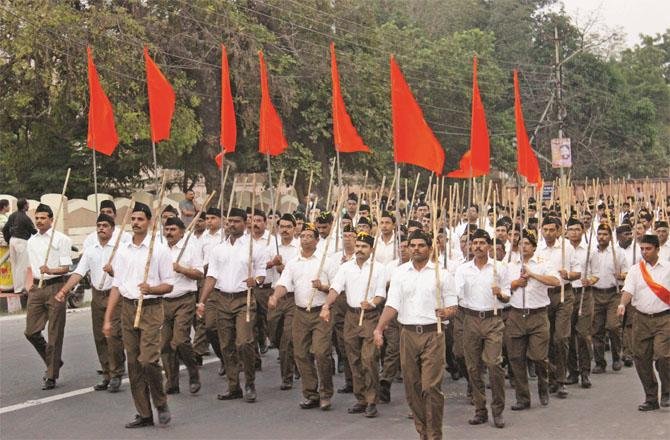Hussain Dalwai says he has proof of the saffron outfit’s violent activities, calls for accountability
Team Clarion
RAIGARH – Senior Congress leader and former Member of Parliament Hussain Dalwai has sparked controversy by labelling the Rashtriya Swayamsevak Sangh (RSS) a “terrorist organisation” that instills hatred and promotes violence among children. Dalwai, in a recent interview with The Economic Times, claimed to possess evidence supporting his allegations, inviting those interested to examine the proof.
Speaking candidly during the interview, Dalwai asserted: “RSS is a terrorist organisation. I have proof of this. Whoever needs proof should come and take it.” He accused the organisation of corrupting young minds through its educational programmes. “They teach children to lie and spread hatred. This is why people like Amit Shah and Narendra Modi, who were trained in RSS camps, lie without hesitation,” Dalwai added.
Dalwai detailed numerous incidents linked to the RSS, including its alleged role in violent acts. He stated, “RSS people are trained in violence, and this ideology is the root cause of many issues in our society.” Citing historical events, he highlighted the assassination of Mahatma Gandhi as a tragic outcome of this ideology. “They still do not regret killing Gandhiji. Rather, they defend the murder,” he said.
Dalwai also referred to the mysterious death of RSS chief Deendayal Upadhyaya, alleging that a suppressed report by a committee led by Balraj Madhok implicated notable RSS figures, including Atal Bihari Vajpayee.
The senior Congress leader further accused RSS members of participating in the 1984 anti-Sikh riots. “There were 49 FIRs registered during the riots, with the names of 300 RSS members. However, when Lal Krishna Advani became the home minister, these names were removed,” Dalwai claimed. He criticised the BJP for shifting blame to Congress leaders, including Jagdish Tytler and Sajjan Kumar.
The riots erupted following the assassination of then-prime minister Indira Gandhi, leading to widespread violence against Sikhs. While the BJP has consistently held Congress accountable, Dalwai’s remarks introduce a new dimension to the narrative.
Dalwai also recounted the 2008 Nanded bomb blast, where RSS workers were allegedly caught making explosives. The incident, which resulted in the death of an RSS worker, marked a significant moment, according to Dalwai. “This was the first instance where RSS workers were directly linked to terrorism,” he said.
When asked whether the RSS should be banned, Dalwai responded cautiously: “I don’t know whether a ban will be imposed or not, but whoever has done wrong should be dealt with. Anyone who violates the constitution in this country must be prosecuted.”
Dalwai’s statements have reignited debates surrounding the role and ideology of the RSS in India’s socio-political fabric. While his remarks have drawn sharp reactions from the BJP and RSS, they underline a broader discourse on the influence of political and ideological organisations in shaping the nation’s future.
The RSS and its supporters have consistently denied allegations of violence and terrorism, portraying the organisation as a nationalist and cultural group. Dalwai’s remarks, however, add fuel to a contentious and ongoing debate.

